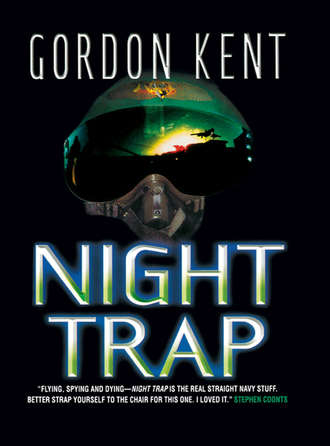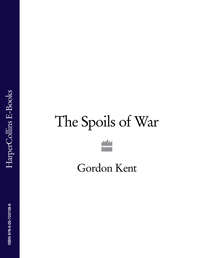
Полная версия
Night Trap
He sat with a cup of coffee before him, hurt as he thought he had never been hurt before. Around him, the level of voices was higher, somehow tighter, the ones who were going sounding too loud and too happy. A few who couldn’t wait were already fiddling with their gear.
Maybe, he thought, it’s better in the long run not to get what you want. Maybe disappointment makes you a man. Maybe the moon is made of green cheese.
“Been looking all over for you.” The voice was right above his head. A hand fell on his shoulder. His skipper’s.
Alan looked up. His heart lurched. The hand squeezed. The skipper was looking away from him, off to a group of pilots; he shouted, “Gilder, I gotta talk to you, pronto!” He turned back, looked down. Their eyes locked. “You’re going. Get into your flight gear.” The hand lifted and fell—a pat on the shoulder. And then the skipper was gone.
He was going.
Alan was only human. He longed to go back to CVIC and drop just a hint, to see the envy of the other IOs, that he was going on a real mission. Cheap thrill, he thought—but he almost did it anyway, saved from doing something tacky and small-minded and altogether satisfying because there just wasn’t time. Instead, he bolted for his stateroom and started to twist himself into his flight suit.
His roommate looked up from a magazine, said with total conviction, “Lucky fuckin’ prick!”
He already knew.
Surfer was a seasoned flyer, had taken him as a roommate instead of another pilot so as to teach him some substratum of ethics or manners that wasn’t in the books.
“I wish it was you.”
“Like hell.” Surfer rolled the magazine in his hands. “Skipper asked me, I told him he goddam better let you go.” He gestured with the magazine. “You deserve it.”
“We’ll probably go down on deck.”
“You’ll probably be the first Spy in history with a fuckin’ Air Medal you mean.” Surfer nodded with sad conviction. “Get the fuck out of here.”
Alan finally got his left foot into his boot and grabbed his helmet bag from his rack. “Don’t wait up, dear.” Surfer gave him the finger as he closed the hatch.
Mick Craik went over the details of his mission for the hundredth time while two para-riggers moved around him, squires to a knight in green armour. One part of his brain—the part that was squadron skipper—noted that Tiernan, the problem child of the rigger shop, was suddenly conscientious about his duties, made a mental note that maybe what Tiernan needed was more responsibility, not less. Another part of his mind—the NavAv part—noted that his helmet had finally been retaped; his personal coat of arms, a fluorescent orange net catching a burning plane, glowed from the LPO’s desk in the corner. The seasoned pilot in him noted that his young bombardier-navigator was having a more difficult time than usual getting his gear on. Kid was nervous.
Hell, he was nervous himself, and he was one of three people on this strike who had actually done it before. The difference was, he thought, that the boy was probably worried about intangibles: bravery, cowardice, the unknown. Craik was nervous because he didn’t like the plan: not enough gas in the air, some of it too far forward; too much contempt for the Iranians, not enough worry about blue on blues over the target.
But that wasn’t really it. What he really didn’t like was that the targets had been set in Washington. He was leader for the whole strike, but he was an arrowhead on an arrow launched by politicians. He liked a different plan, his own plan, with a different target picked out here by the people on the spot: bomb the Iranian Navy base at Bandar Abbas. No chance of error, and a very direct message.
He patted the BN on the shoulder, gave him a reassuring smile. “Piece of cake,” he said.
Miles away, his son ran down the main portside passageway toward the aviators’ wardroom, the eatery known locally as the Dirty Shirt. His nose told him that chocolate-chip cookies had just been baked, and he meant to get some for his crew and fill his thermos with coffee. Rafe called him “the stewardess,” but there was no barb to it; in fact, Alan believed that it was one of the things that the Spy did that made his crew think he might be a regular guy after all. He scooped twenty or so out of the cookie bucket with a practiced hand, ignored the mutters and shouts of the onlookers, and dumped them into his helmet bag. He filled his thermos (L.L. Bean, stainless, one of the few gifts from his mother that was right on target, considered so valuable by the crew that it had never been part of a practical joke) and bolted back down the passageway. He left behind a circle of indignant Tomcat RIOs, equally upset that he was flying while they sat on their asses and that he had taken two dozen cookies.
Can’t take a joke, fuck ’em, as Rafe liked to say.
2120 Zulu. The Iranian Coast.
It was dark along the Iranian coast. The noncom they called Franci was not a very willing soldier, but he was an able one. In fact, he made the decisions at his SAM battery, although the orders were given by an officer who had less real knowledge but a more reliable history.
Now, Franci was chewing his moustache and smoking. They had been ordered up to full alert every night for two weeks—missiles on the rails, radar warm and ready. The imams apparently believed the American demons were coming. Franci supposed they were—he had lived in America, knew the almost casual belief in exercising power. The reverence for the gunslinger, he thought.
So he sat in the command trailer and waited.
The box had arrived five nights before. It had been bolted on the main radar dish. The zealot who had brought it had said that it would see the infidels as they crossed into Iranian air space. This was a story for children, in Franci’s view; six years at the University of Buffalo, from which he had been forced home by threats to his family, convinced him that the box must somehow turn the dish into a (probably inefficient) passive detector. The zealot had sworn that when the blue-green light went on in the command van, the Americans would be coming.
And so they would be, Franci mused.
He had also seen the Revolutionary Guards bring in a missile launcher of their own, now standing well clear of the SAM battery. As usual, it looked like industrial scrap held together with string. The RGs loved toys, he thought—no, “Correction,” as his American friends used to say, all Iranians loved toys—look at the outboard boats mounted with machine guns, the taxi-mounted rocket launchers. Gadgets for a preindustrial theocracy.
The missile, when he had been allowed to glance at it uncovered, had looked to him like an ancient I-Hawk with the front end tarted up. The electrical engineer in him had cringed. It had looked like trouble to him. Big Trouble. Things meant to go bang were always big trouble for somebody unless they were properly designed and engineered.
So he had approached his own officer about it, although coming at the matter circumspectly, after the fashion of a stray dog approaching a kindly voice—sideways and ready for a kick.
“Ha, Rasi, and how is your wife?” he had said.
“She is well, soldier of the servants of God. Soldier, I am not to be addressed by name by you with, ah, hmm, them here.” He had nodded toward the shrouded missile, as if it represented the Revolutionary Guards in all their power. And their narrow-mindedness.
“Rasi, may your name be blessed,” Franci had said, not able entirely to suppress irony, “friend of all soldiers, I abase myself,” and he had started to kneel, causing the officer to wince and urge him to his feet. Enough was enough, obviously.
However, they had got to the real subject. “These Revolutionary Guards,” Franci had said. He had nodded toward the missile. “The Hour is almost upon us, and their creation is, um, in the sun.”
“What? Hour? What hour?”
Franci had got excited. He could deal with idiots only so long. “The Hour! Are you incapable? The Hour when our camouflage is supposed to be up! When everything must be covered! When—!” He had swallowed, flapped his arms up and down and slapped his sides. Then, more calmly, “When Tehran tell us we must be invisible to the eyes the Americans have put in the heavens to circle the earth.”
“You go far beyond yourself to shout at me. This is not proper. I will note it. Somewhere.” The officer had pulled at his open collar as if he wished for a more formal, more dignified uniform. “The Guard take care of themselves. Maybe they have their own camouflage. We do not tell them what to do. They are the Guard!”
Franci suspected they were shepherds who couldn’t read a word of the Koran, but he didn’t dare say so. Instead, he had said with the measured slowness of a man talking to a child, “They will give us away. They will give away the missile we are not supposed to see. They will get us all killed.”
“It is the will of God.”
Franci had sighed. He had not quite dared to say that the will of spy satellites worked no matter what God—or at least the Revolutionary Guard—might say.
So now, tonight, he sat in the command trailer and smoked his fifteenth Marlboro and watched the blue-green light that was supposed to come on when the Americans arrived.
And what would happen when it did?
2210 Zulu. The Gulf.
Skipper Craik walked slowly around his plane, looking into every opening, running his hand lovingly down her wings to her body, then crouching to look at her landing struts and gear. He never thought of the process as sexual, never saw the plane as a woman, although he would concede he had seen men run their hands over horses this way.
He glanced up to make sure that her chaff and flare cartridges were full, and as he did so was vaguely aware that the sailor coding his plane with an IFF gun was a stranger. Probably a recode, he thought; they changed IFF at the last minute, sometimes. Still, his BN had already got a sweet and sweet on deck, so why change it now? The question was an annoyance, low priority, not even a worry; he’d ask the kid what happened when they were on the cat.
He ran his hand up inside her jet intakes, checking for FOD or debris. Once in a while, some sailor with a grudge put a coin up there. He’d heard of a can of concrete, in another squadron. The fact that he had never found anything didn’t stop him. It was part of his ritual. He checked his car the same way.
If he checked it himself, nothing could go wrong.
Alan was finally ready. The frontseaters had already walked to the plane, but Senior Chief Craw refused to be hurried, even seemed to be dawdling. The delay covered nicely for Alan’s perpetual confusion about what order to put his flight gear on.
Master Chief Young, the senior enlisted maintenance man, met them at the back door to the ready room. He was kitted up for the flight deck.
“Got a present for you, sir,” he said to Alan.
Alan looked around a little foolishly. Master Chief had a way of doing that to him. Going on the mission was all the present he wanted; what else could there be?
“On deck,” the Master Chief said. They followed him down the passageway to the sponson, then up behind the tower.
All around them, the carrier was preparing for battle. Bombs were going by on carts; fuel lines were being laid out to planes; aircrews were checking them while lastminute maintenance was done. The heavy stink of kerosene filled the air.
Right at the elevator-deck edge sat Christine, long since repainted to cover the jokes left by their sister squadron on the Roosevelt. The facelift made her seem young again, and, caught in the glare of the launch of an early-cycle F-14 on burner, she was the most beautiful plane Alan had ever seen—a tribute to his loyalty, to say the least. Bulbous, big, and awkward, she towered over them like a bad dream.
Alan belatedly switched on his blue light and bent to perform his one preflight responsibility, the chaff and flare pods; the Master Chief grabbed his shoulder, turning him up and toward the fuselage, instead. He pointed.
Alan had to look for some seconds, then found it just below the TACCO’s window. There, stenciled on the gray hull, it said: LTJG ALAN CRAIK.
His name on the plane.
It meant acceptance—more, approval. And permanence. And what’s more, Rafe must have okayed it. Or even suggested it? Alan stumbled into the aircraft, knowing he was blushing and glad for the darkness, unable to speak. He almost forgot to preflight his seat.
Mick Craik sat on the cat, his eyes wandering over the instruments as he took his baby to full power. The earth moved, but the gauges were good; she was a goer. He and the kid began the priest-and-acolyte formula of prelaunch checks. He reached for his inner calm, found it, and pulled it over him like an old, loved coat. He wished he could do the same for the kid. If his boy were going, he’d want—
Where is Alan? he wondered. Surely Harry wouldn’t let him go on a live one like this. So you’d want him to treat your kid specially, and let somebody else’s kid go? he asked himself. He was no good at self-doubt; he pushed the question away.
He thought the S-3 tankers were being put too close to the coast—big, fat, dumb grapes waiting for some Iranian MiG jock to bag them. He had made the objection to Staff; a lot of good it had done. At any rate, he didn’t want Alan up in one of the tankers tonight. One Craik in the air was plenty. Anyway, Alan had a different future: he had a kind of smarts that his father felt he lacked, the kind that could take you to admiral. Mick Craik, he thought, would retire where he was.
Craik looked around. Planes crouched on every cat, and more waited behind every jet-blast deflector. Fire and light filled the darkness, and, as happened every time he saw it, he was filled with the power of it and moved by what he thought of as the glory. Not much glory left in war, he thought, but we still hear the tune.
This was the center of his life, the heart of his belief. This is where we treat people fair, and a guy who works and plays the team can get ahead. This is where they respect competence instead of bullshit, because when the chips are down your bombs either hit the target or they don’t. Skipper Craik had known some pretty weird types in naval aviation, but they all got measured by the same stick; either they could fly, or they couldn’t. And this was his America, not abstractions like liberty, Western democracy, capitalism, but a place of no-bullshit that offered great cars, great women, great flyfishing, and the most beautiful mountains on earth. For that place, he would climb into his fiery chariot and ride like the wrath of God against people he had never seen.
The blast deflector came up behind him. A blur of green showed as the cat crew hooked on the bridle.
Mick Craik loved “The Ride of the Valkyrie.” It went with the noise and the thrill of this moment on the cat, the first seconds of launch. He wished they could play it as the cat blasted them forward.
He was The Old Man in squadron myth, skipper in fact, old by comparison with the kids, and he knew that this was his last cruise with a stick in his hand. Yet he was eager to go. He wanted to prove himself one more time.
This was what he lived for. No women’s tears, no bill collectors, no bureaucrats. Just the stick and the target.
The cat officer crouched and began to extend his arm.
Dear God, he prayed silently, as he always did, make it a good one if it’s the last.
He snapped his best salute and they began to move.
Alan was ready for the cat when it came. For once, the sickly dust/electrical/old sweat smell of naval aviation was not threatening him with instant airsickness. Airborne, Rafe got a good IFF check from the boat and they cheered; Christine’s IFF was, according to legend, entirely constructed from chewing gum and old slinkies. Rafe started her on the long, slow climb to their tanker station as Narc began cycling through volumes of kneeboard cards to figure out how he could talk to their fighter cover—the entire launch and deployment was being done EMCON. Senior Chief began inserting radar frequencies into a computer hit list. Alan, with the back end online and for once in his life way ahead of the mission, was wiping the inside of his oxygen mask with an alcohol swab stolen from sick bay. He figured they would be on oxygen if anything happened, and the taste of old pizza would not help his airsickness.
He thumbed the intercom switch and began his stewardess routine. He tried to keep elation out of his voice, suppressed the urge to burble his thanks to everybody as he said, “Folks, we’re going to level off at Angels 23 and cruise there until someone needs gas, at which time Rafe will fart down the pipe. In the meantime, espresso and chocolate-chip cookies are being served by your flight attendant in the main cabin, and will remain available until we touch down at Cedar Rapids International. And thank you for flying Naval Air.”
Rafe let out a whoop, and a flight-gloved hand reached down the tunnel. Alan pressed the thermos into the hand, balanced two cookies atop it.
He turned to his monitor. Their radar was off, but he could watch other, active radars with his system, picking up the Iranian EWs as they arrowed from the coast. He began to log each one for the future. Someday, he thought, all of this will be done by a computer. Christine, however, couldn’t handle the math of multiple radar cuts.
Alan found that he didn’t like what he saw. His divided self tossed the information back and forth, TACCO to 10 to TACCO, and what they agreed on was that there was an unusual amount of Iranian radar activity. It indicated what they both saw as a very high degree of preparedness. Alan hadn’t expected to surprise the Iranians; the Persian Gulf is too small for that. But he had watched the IADS from routine flights, and he knew what it looked like on an ordinary night—a lot of bored operators flicking on and off, some sites never coming online in a whole seven-hour hop. This looked more like a carnival; everybody was up. Everybody but the SAM sites; they were asleep, while the EW net seemed to have insomnia.
He looked at his watch. The strike was due to go feet-dry (over the coast) in two minutes.
Somewhere out there was his father, doing the glory thing. He knew his father well enough for that. He knew the slightly husky tone when he spoke that word, glory, the refusal to elaborate. Glory had magnetism for Alan now, too, although when he had been a teenager he had thought it was bullshit, something old men invented to get young ones to die for them. Now he lived with men who believed that glory was the goal of life: men of a certain kind—real men, they would have said—went where it drew them. He was not yet sure what kind of man he was, but he knew he felt that pull.
But you could think about glory and continue to massage data for only so long. Then something in the data fell together and you forgot about the glory. Now, a disquieting pattern showed: even in EMCON, one of the E-2C Hawk-eyes was running the datalink, and a series of neat diamonds, denoting friendly aircraft and ships, lay over the screen like coarse mesh. What was now clear was that the activity of the IADS matched the diamonds. It did not take the Intel half of his head to tell the TACCO that the Iranians had this raid pegged.
That’s what the Nav gets paid for, he thought. Better equipment and better training ought to do the job. No sweat. Right?
POI Sheldon Bonner sat in the head and felt his entire gut shiver, as if there were ice there instead of the fire that seemed to explode under him. It had been getting worse for days, diarrhea like something you picked up in some godawful liberty port where you couldn’t drink the water or eat the fruit. Sick bay had given him pills. Christ, what a joke.
“Jeez, Boner,” a voice said from the next stall. “What’d you do, swallow some of the ordnance? Christ, if I smelled like that I’d kill myself.”
“Fuck off. I’m sick.”
“I’d tell you to blow it out your ass, Boner, but that seems to be your specialty. Whoo-hoo! Jesus Christ, ask for a transfer, will you?”
His hands were still shaking. He had seen the pilot look at him and he had forced himself to go on setting the IFF code, when what he wanted to do was drop the gun and run. The guy had looked right at him. Fucking skipper of the squadron, helmet all fluorescent orange tape, one of the joy-boys, guts and glory, all that shit. Fuck him. Let him see what it was like when he got to Iran.
He felt his bowels let go again. It would be like this for another week.
It’s worth it, he told himself. He tried to see the boat he would buy. He had a mental picture he called up at night before he went to sleep, him and his boy on the new boat. Fishing on the St John’s. Beer in the cooler. Then he’d tell the boy about the scheme and the money and how they were going to be partners. Together. Just the two of them. It would be wonderful. It would.
His insides heaved and squirted and he groaned aloud.
2315 Zulu. The Iranian Coast.
Franci worked with the intensity of a man at last able to do what he understood—tracking contacts, passing data, answering the telephone—using technology. He was one of the very few who understood how the electronic fortress works, and he had created his own informal phone link with others like him. For the duration of the raid, he was alive.
Now, he knew that a rain of anti-radiation missiles had begun. To turn a radar on was to invite death; he did not. Yet, through the eyes of a radar on a hill thirty miles behind him, he was able to watch the Americans come on.
The trailer door opened; a surprisingly courteous voice said, “Who is in charge, please?” It was a Revolutionary Guard full colonel. Everybody but Franci’s officer pointed at Franci.
“I am in charge,” the officer said.
“Show me the situation.”
The officer turned smoothly to Franci. “Show the colonel the situation.”
Franci didn’t care who got the credit or what the pecking order was; he was caught up in the pleasure of doing the job. “They are coming in two strikes from the carriers, about forty miles apart. Northern strike will pass directly over us—unless we’re the target, Allah forbid. Seven minutes to arrival.”
The colonel handed him a cellular telephone. “Pass course and speed data to my shooter. No radar illumination until you are so ordered.”
Franci was enthusiastic about not illuminating the radar: why make themselves a target?
The colonel left the trailer; Franci’s officer teetered on his toes and watched the clock; Franci passed data and plotted vectors. Six minutes. Five minutes. Four. Three.
The Revolutionary Guard detachment fired their mysterious missile at six miles. Radar recorded one plane falling below the formation—an evident hit. Franci reported it on the cellphone.
“Illuminate your radar. Fire all missiles, whether targeted or not. This is a direct order from the colonel.” It was like an order to commit suicide.
His fire-control radar stayed on for less than ten seconds before a HARM missile, launched minutes before, identified it as a first-priority target and zeroed in.
Franci felt the earth heave, and God reached for him.
2322 Zulu. The Gulf.
A new signal had just lanced out from the mainland. Alan hooked it and read its stats. Weird—not anything he remembered. He leafed through his notes and didn’t find it. Then, too quickly, it disappeared and he was left to log it. Somewhere in the parameters of a Chinese early warning radar, he thought. It had been on only eight seconds. Maybe somebody had shot it with a HARM. Maybe its operator had panicked at what he saw and shut down.






